
Dec 8, 2022 | Blog, Internet of Things Security: Challenges and Solutions, Intranets, Business Process, and Knowledge Operations, Machine Learning, Artificial Intelligence, and Data Science
In our new episode of Machine Learning, Artificial Intelligence, and Data Science in the Knowledge-Driven Enterprise, we discuss business drivers, future vision, technologies, and the framework supporting proactive user experiences in information technology.

Dec 28, 2020 | Blog, Intranets, Business Process, and Knowledge Operations
Cars field more than 100 sesors. All these sensors turn our automobiles into mobile Internet of Things (IoT) devices. With on-board computers providing a vast number of functions, including mobile communication and entertainment systems, most cars today can also perform limited auto-piloting, communicate with nearby cars, and transmit sensor data over the internet. All of these activities are made possible because of increasing deployment of 5G.

Mar 22, 2019 | Blog, Intranets, Business Process, and Knowledge Operations
Have you experienced a slow sinking sensation when it comes to keeping your IT systems current, operational, and relevant? Do you feel that you are being asked to do more and more with less and less?
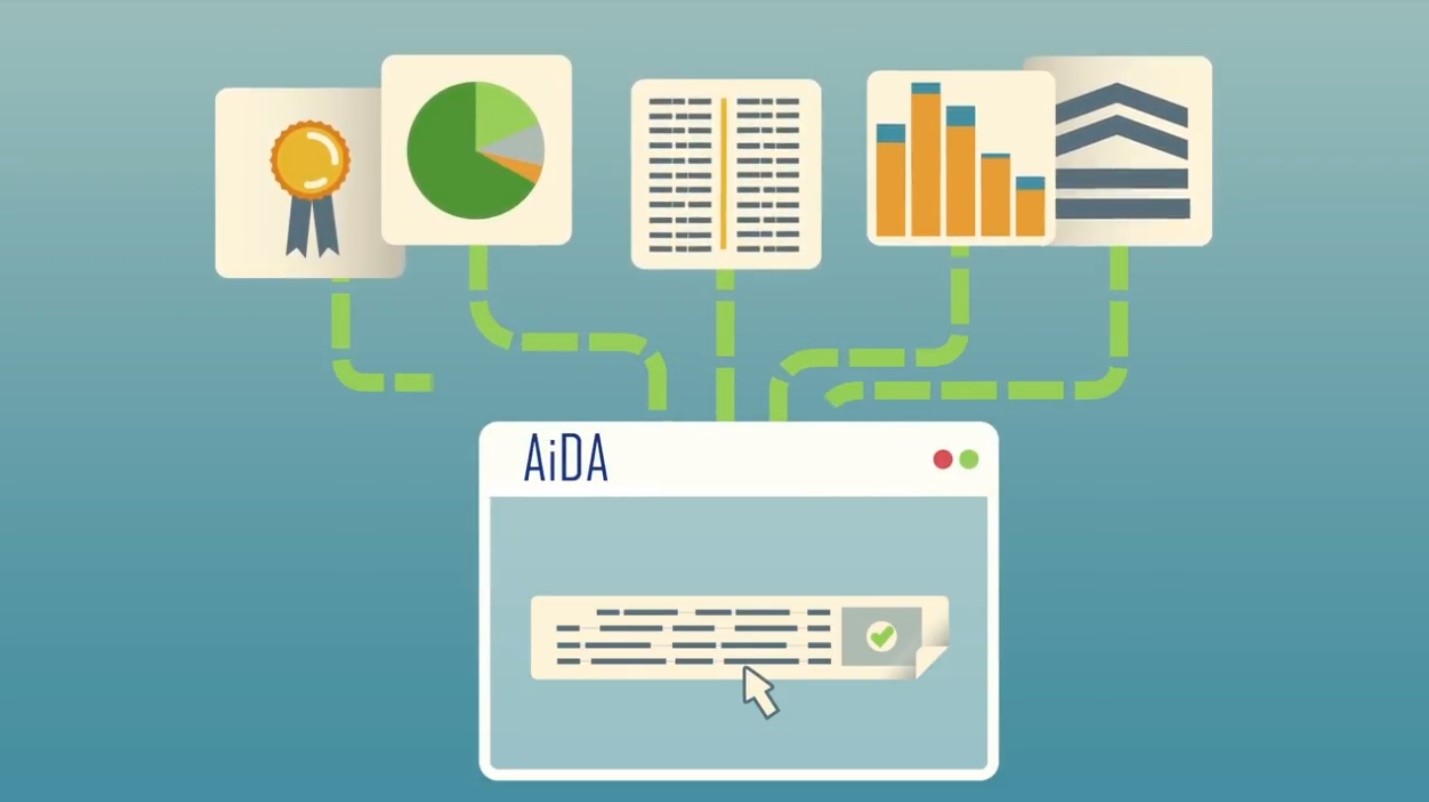
Jun 27, 2018 | Blog, Collaboration, Partnerships and Social Media, Intranets, Business Process, and Knowledge Operations, Knowledge Advantage, Knowledge Operations, Learning Organization
Federal acquisition is easy and straightforward, said no one ever. Rules, regulations, policies, procedures, definitions, requirements, contracts, forms—constantly updated …

Oct 2, 2017 | Blog, Intranets, Business Process, and Knowledge Operations
When we interviewed Angela O’Hanlon 18 months ago, she reported that the key to the success of the ATS Lab was listening—to sponsors and industry, to staff and leadership. What did they need and want? This capability has since traveled a long way and shows no signs of...

Sep 6, 2017 | Blog, Intranets, Business Process, and Knowledge Operations
Although I’m a mere mortal myself, I do admire leaders with the gift of inspiring—not ordering—others to collaborate and do meaningful work. Command and control approaches are easy to set up, but they don’t necessarily enable enduring greatness or creativity. The...

Aug 7, 2017 | Blog, Intranets, Business Process, and Knowledge Operations, Knowledge Advantage
Herbert Simon wrote that “What information consumes is rather obvious: it consumes the attention of its recipients. Hence a wealth of information creates a poverty of attention, and a need to allocate that attention efficiently among the overabundance of information...

Jul 17, 2017 | Blog, Cross-Organizational Information Sharing, Intranets, Business Process, and Knowledge Operations, Knowledge Advantage
As the author of this post observes, there’s an emotional component to the exchange of knowledge via games that goes beyond just having fun. Serious games may increase loyalty, engagement, and participation in tasks.—Editor Author: Michael PackPlaying games is one of...
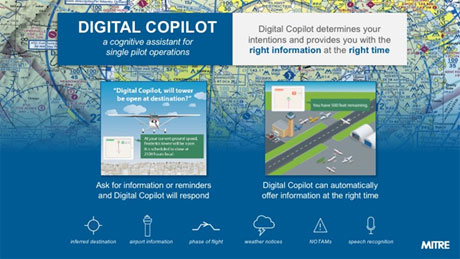
May 22, 2017 | Blog, Intranets, Business Process, and Knowledge Operations
One CAN be the loneliest number if you’re a pilot flying solo. Each year in the United States, about 450,000 private aviators take to the sky sans crew, which can be three times riskier than accompanied operations. Enter Digital Copilot, an intuitive technology that...
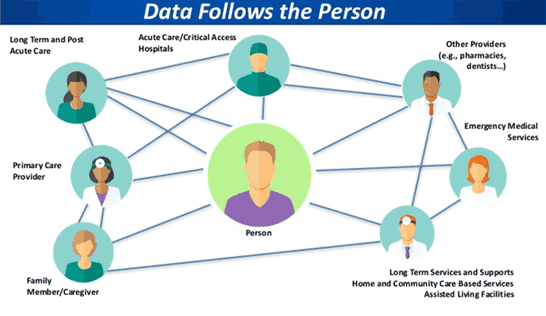
Sep 20, 2016 | Blog, Intranets, Business Process, and Knowledge Operations
Have you ever filled out medical forms for yourself or a family member by hand and more than once? I can hear you sighing yes. So you already understand the potential goodness of having your data follow you in the form of a safe, accurate electronic record. Still,...
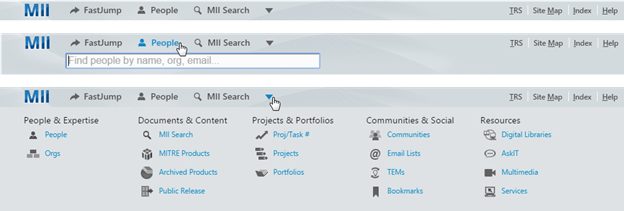
Mar 7, 2016 | Intranets, Business Process, and Knowledge Operations
Marcia Nunes’s post on mobile-friendly headers is a good reminder that ease of use is not magic, that human factors specialists are central to user experience, and that MITRE takes their counsel seriously.—EditorAuthor: Marsha NunesProviding a consistent user...
Feb 26, 2016 | Blog, Collaboration, Partnerships and Social Media, Documents, Intranets, Business Process, and Knowledge Operations
This guide describes and points to resources that help staff thrive in their assignments. It outlines the tools and systems in place for planning and execution, all in support of the way that MITRE does business. As staff enable reliable knowledge capture and reuse,...

Feb 26, 2016 | Blog, Intranets, Business Process, and Knowledge Operations, Machine Learning, Artificial Intelligence, and Data Science
Authors: Marilyn Kupetz and Angela O’HanlonMITRE’s Analysis Tool Shed Lab (ATS) program is one of MITRE’s largest R&D Labs, focusing on analysis capability and analytic activity. Lab users acquire hands-on experience with 100+ tools and datasets, MITRE prototypes,...

Dec 16, 2015 | Blog, Cross-Organizational Information Sharing, Intranets, Business Process, and Knowledge Operations, Knowledge Advantage
Brett Profitt’s observation that “MITRE sets teleworkers up for success, but teleworkers must endeavor to be successful” resonated. No matter how many business process tools an organization makes available, staff have to use them to good end. And he does, mentioning...
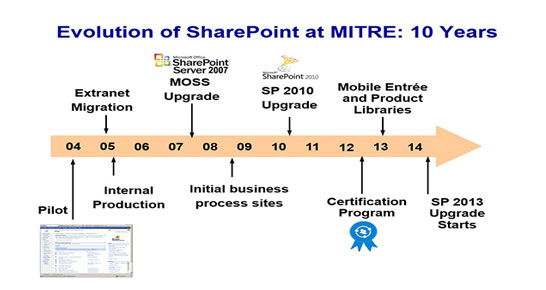
Jan 20, 2015 | Blog, Intranets, Business Process, and Knowledge Operations, Knowledge Operations
MITRE started using SharePoint with a small pilot in 2003 and now has a robust set of several thousand intranet and extranet sites based on SharePoint 2010. It is used as a content management platform, a collaborative team platform (for projects, organizations and CoPs), for work process capture and scheduling, employee engagement, and blogging. It has become critical to MITRE’s business processes, resulting in an evolution of its capabilities over the years.

Dec 16, 2014 | Blog, Intranets, Business Process, and Knowledge Operations, Knowledge Advantage
Each of our IT service managers is responsible for operating their service, measuring its impact, managing its cost, and evolving the service over time. How the service evolves, or its “roadmap”, is based on changing user requirements, product evolution, technology changes, cost pressures, and industry trends. The service manager must stay informed and continuously question their assumptions as they develop their roadmaps. But almost as important as the ability to develop their roadmap is the need to communicate their roadmap.















